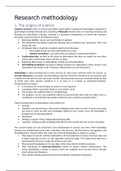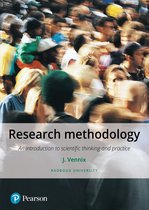Research methodology
1. The origins of science
Empirical research relies on sensory perception (observation) to generate knowledge as opposed to
generating knowledge through pure reasoning. Philosophy heavily relies on reasoning. Knowing and
learning are interrelated concepts. Learning is a pervasive characteristic of human life. However
learning is quite hard due to the following issues:
Reasoning abilities: we are not clear thinkers in general
The impression that debate is good for learning: due to emotions and “spectators” this is not
always the case
All relevant theory should be consulted, which is hard because:
o There might be just too much information on a topic
o ‘Selective perception’: you select what you believe is relevant information
Confirmation bias: we tend to be critical to information that does not match our own ideas
and be soft on information that confirms our ideas
Explaining things away or rationalising: coming up with explanations
Self-fulfilling prophecies: we tend to behave towards our expectations which results in the
expectations becoming “truth” (however influenced by our own behaviour)
Methodolgy is about learning how to learn and has its roots many centuries back. For science, an
anarchic-democracy is needed. Anarchic linking to the fact that there should be no one operson who
is arbiter of truth and the best way to get at truth. And democratic because everybody should be able
to freely voice their opinion, whatever it is, as long as it is based on arguments/evidence.
Characteristics of science:
It is common for incorrect ideas to exist for a very long time
Cumulative effort: researchers build on each orther’s work
Can be slow, but suddenly there is a breakthrough
The progress can be very powerfull halted by preconceived ideas that are either tacit or
considered so normal that most people would not even consider to question them
Typical characteristics of philosophers and scientist are:
Curiosity
Scepticism and perseverance: they tend to disbelieve what they are told. To prove your point
you have to come up with new knowledge (different from school, were old knowledge is
brought over to new generations)
Persistence
Thinking: superior critical, independent thinking skills
Creativity: coming up with something that did not exist yet that can also concern new ideas
The ancient Greeks are very important in the development in science over time. Their knowledge
however was initially deduced by other civilizations, like the Jews, the Phoenicians, the Egyptians and
the Babylonians. Characteristics that made the Greeks distinguisable in relation to science:
They began to look for rational explanations. The development of science has been slow and
it took a long time to focus on only rationality instead of magic. The Greeks were the first to
start doing this (however magic did still play some role).
They pursued knowledge for its own sake, rather than only for practical purposes.
They introduced an axiomatic-deductive branch of science (mainly mathematics). This
means identifying a number of axioms which are evidently true and from there, through
proof, derive new theorems.
They started looking at phenomenoms from different viewpoints (Herodotus)
, They were the first to start thinking systematically and comprehensively about the concept
of knowledge itself.
The most important Greek philosophers were Plato and Aristotle. Plato tried to fit nature to a
preconceived intellectual scheme. He believed God created the world ideal and that the ideal forms
can only get to be known and understood by pure thought, not through the senses. In other words,
the world of appearances lead to speculations about the ‘real’ (ideal) world which is behind the
phenomena. The implication is that true knowledge can only be acquired through reason. Aristotle
(student of Plato) however constructs his intellectual scheme to fit what is observed in nature. He
was much more open to empirical reality and our sensory perceptions as a source of knowledge.
However, he was well aware that what is observed, needs rational abstraction to produce
knowledge.
The questions arrises why the Greeks were the ones with heavy impact on science and not some
other civilization? The Greeks introduced a tradition of critique and were much more adversarial. For
example the Chinese were never in doubt that the wise and benevolent rule of a monarch is the
ideal, but the Greeks disagreed about the best political constitution. In the Greek civilization
discussion and rhetoric were much more part of the common ‘adversarial’ culture.
2. The scientific method
Deductive logic works from the universal (the general) towards the individual (the specific). The most
famous example is the syllogism: the form of argument consisting of two premises (P) and one
conclusion (C). The conclusions follow by necessity from the premises. If the premises are true, than
the conclusion is also true. Critique to this is that is does not generate new knowledge. Also, the
truth of the conclusion depends on the truth of the premises. This results in a distinction between a
valid argument and a true conclusion. However, the correspondence with reality is not the topic of
formal logic. There are four different situations concerning the syllogisms:
Modus ponens if p then q; p holds; therefore q. This is true.
Fallacious argument, denying the antecedent if p then q; not p; therefore not q. Other
reasons could have made q occur as well, therefore this is false (non sequitur).
Fallacious argument, affirming the consequent if p then q; q; therefore p. Could be other
reasons why q happened, therefore this is false (non sequitur).
Modus tollens if p then q; not q; therefore not p. This is true.
Deductive science do not take empirical phenomena as their point of departure, but rather start
from particular axioms, that is why it is called axiomatic-deductive science. People who do not have
confidence in sensory perception use this most.
In inductive logic you go from the specific to the general, from observing a set of empirical
phenomena to a genral statement. A shortcoming is that it does not lead to general statements of
which we can be certain. In that respect we have to distinct complete and incomplete induction. A
complete induction: all X have been studies all studies X have Y conclusion: all x have y. This
also does not generate new knowledge. In incomplete induction you make a leap from the specific to
the general, which in that sense does add new knowledge. Bacon attempted to arrive at a more
systematic inductive method: he stated that not only cased that contain the statement should be
included, but also cases that are not characterised by the statement.
Inductive science rely heavily on observation of empirical phenomena. It is all about finding patterns
and regularities. Some problems with induction:
Unprejudiced observation human observation is influenced in many ways
Misunderstanding that through induction hypotheses to explain the phenomena will more or
less automatically surface, which is not true
Abduction means creating a hypothesis (conjecture) which can explain an empirical phenomenon.
, You have context of discovery: the situation in which ideas and hypotheses are generated, which
should explain certain phenomena. The context of justification is the situation in which ideas,
hypotheses and theories are tested against logic and/or empircal evidence. Here the central issue is
how we can prove that a certain expelanations of a phenomenon is true or accurate.
Some core concepts in science are:
Models a simplified representation of a certain phenomenon. Models are (justified)
simplifications and they are visible (except for mental models). Types of models:
o Implicit (mental) vs Explicit
o Explicit: conceptual vs physical
o Conceptual: verbal, schematic or mathemetical (in computer: computer model, to
make calculations with)
Law about patterns and regularities. Two categories:
o Normative law: prescribe what should and should not be done
o Establishing law: based on observations one establishes a certain pattern or
regularity in emperical data. Build on algorithm: if you carry the law out correctly,
than it will fulfill the intented purpose. In order to call an empirical regularity a law,
one needs a kind of necessity or inevitability.
Experiment an artificial research setting, created for the purpose of testing hypotheses. In
that sense they are opposed to ‘pure observation’. However, you still need observations in
experiments; without observing you would not know the results of the experiment.
Hypothesis in abduction a hypothesis is an explanation for the observerd phenomena: a
statement used as a preliminary stage of theory: the working assumption (conjecture).
However hypothesis can also be as a consequence of a theory, which can be tested
empirically.
Theory facts and statements ordered in a logical, consistent whole. A theory is supposed
to explain certain phenomena (just like hypotheses). A law does not necesarilly explain why,
but a theory does. A theory is a thought construction which attempts to explain a number of
empirical regularities. A law can be tested empirically, but a theory can not since it’s scope is
too large and it often contains a number of concepts which temselves are not empirically
verifiable. However you can draw conclusions from a theory, which you can empirically test.
A theory is thus a coherent and consistent set of statements and incorporating concepts. A
theory should be parsimonious: large scope, little concepts.
The scientific revolution took place in the 16 th and 17th century, startin by Copernicus, Kepler, Falilei
and Newton. A dramatic change in the way scientific knowledge was aquired occurred. Some speak
of a paradigm shift. A paradigm is a perspective on what constitutes a legitimate way of conducting
philosophy and science, which includes theories, methodologies, but also depeer assumptions about
how to acquire knowledge. So not only theories changed, but also methods used and the way to
acquire knowledge. The new scientific method works this way: observe a pattern (induction), come
up with hypotheses that can explain the observer phenomenon. Then test these hypotheses
systematically by deduction. Carrying out an experiment will produce the test outcome and then a
conclusion can be drawn.
Bounded rationality means that humans can only process a limited amount of information, which
makes full rationality virtually impossible.
Ockham’s razor means that if we have two explanations, the simpler of the two should be chosen.
Method of analysis is coming up with ideas about the causes of certain phenomena (abduction).
Method of synthesis is coming up with actual proof that the cause produced the phenomenon.





